- Getting around Lijiang. Dont stay in the Old Towns more than 2 days, there is nothing to do. KRISS Oct 9, 2013 05:46
- 2013 Beijing Temple Fair BENNYLAU Feb 26, 2013 03:29
- Malaysian traveling from KUL - LAX vis Shanghai PVG ZATI_DY Jan 3, 2013 20:15
Full Moon, Fox Furs and Silver Shells
- Views: 3236
- |Vote: 0 0
- |Add to Favorites
- |Recommend to Friends
The air is crisp and cold as we step off the plane. It has been a short one-hour flight and as we made our final decent we flew low over mountains with a dusting of snow, like icing on a bun loaf, the last vestiges of winter before the landscape blooms again in spring. I have my fleecy jacket on before we leave the plane and I’m diving for my socks and windbreaker as soon as we enter the terminal. Back in Chongqing, known as a ‘furnace’ it was almost summery as we boarded our flight earlier in the evening. Thankfully we do not have to walk the tarmac of this high altitude airport like I did three years before. There are covered boarding ramps and shops selling winter parkers in the arrivals lounge that is now centrally heated, in contrast to the often-harsh conditions outdoors.
As suspected there is no shuttle bus to our destination since most independent travellers are going directly to Jiuzhaigou or Huanglong and well-packaged tourist have a coach waiting at their disposal. A billboard in the car park advises us of the going rate for a taxi fare to several destinations. Ours is a hefty seventy kuai into Songpan where we plan to spend the first night of our adventure into Sichuan’s Wild West. By eight o’clock it will increase to one hundred kuai – the night-time rate and the sunset hour in these parts. With the next flight from Chengdu due to arrive we contemplate waiting just a little longer in case there are other travellers going our way but when the load speaker announces it’s delayed arrival time we make haste before night falls.
Our taxi driver is of Hui origin, friendly, talkative, informative, and stops a couple of times for photos in the fast fading light. He even calls ahead to his wife to ask if she can reserve tickets for us on the early morning bus to Ruoergai but the station had closed hours earlier. He then shatters our perception of his generous nature by refusing to give us the correct change for the fare. After some heated haggling he grudgingly hands me the correct change and we walk off down the darkening street not too happy with this unpleasant experience just a few hours into our holiday.
It is the eve of Wu Yi Jie – the first of May – China’s Labour Day holiday and I am travelling once again with my good friend Wu Yi. Her name of course has a completely different meaning but I often tease her, calling her ‘fifty one’ – yet another meaning of the same pin yin sounds – although she is more like half this in age. We seek out the guesthouse she stayed in the year before just across the street from the bus station. The family remembers her and shows us straight up to a cozy and comfortable room at the back of their second story traditional wooden home. This will be the cheapest accommodation on our trip. The toilets are a neat, clean segregated block by the front gate. There’s a tap and tub for laundry in the yard and hot water for a sponge bath and a wash up in the morning. In these parts - these Wild West towns - hot showers are more likely taken in public bathhouses.
Songzhou as it was formerly known is an interesting frontier town with a diverse mix of minority groups and a long and interesting history. The most striking feature is the Qing Dynasty walled city that once housed a garrison of the Emperors troops who guarded this remote region from intruders. It’s in the typical square grid layout with the north, south and east gates in the actual wall but the west gate is perched on the small ridge above the town doubling as a watchtower. Nothing passing up or down the Min valley would escape attention. The now small but mighty Min He cuts east-west across town dissecting it in two with one pretty covered bridge on the main north-south street.
When nightfall comes to this quiet town the temperature falls dramatically. We are travelling light and a little under dressed for this cold night so we head down the street for a bite to eat at Emma’s café, a friendly, cozy spot to escape the chill. Small groups of backpackers finish meals or chat in the lounge. We share our table with a Chinese girl from Guangzhou on her way to Langmusi on the border with Gansu where I suspect many of the others are also headed. She’s staying in our guesthouse and arrived early enough to buy a ticket on the only bus leaving for Ruoergai at 6.40am – the one we also want to catch but we will have to take our chances in the morning. After dinner we take a stroll inside the city wall, window-shopping in the small souvenir shops that are still open late.
Most sell everyday local goods like yak butter, which is surprisingly edible, a little salty and what we might consider rancid and only good for cooking. And most are also tailors making and selling long wool, fleece lined coats and vests, bright wool carpets, bike and car seat covers for the locals, yak horn bracelets, silver wear, beads and exquisitely woven and colourful cashmere wraps for tourists. Antique calligraphy brushes made from carved bone and silver overlaid conch shells all the way from the distant ocean, fetching upwards of Y1000, were intriguing finds. Used around the world by many different peoples as a horn for communication, the conch shell produces a penetrating sound when blown. I hold a large shell to my ear, listening for the familiar sound of crashing waves. Despite the passage of time – many centuries in fact – since this shell was in the sea it does not disappoint me, as a soft hush whispers in my ear – the soothing sound of the sea.
In one store we find a man looking at a beautiful white fox fur. He poses for me and I in turn pose for him. We take a few more fun photos of each other in the snow-white fur and move on. This is just the beginning – from now on we will see the skins of tigers, wolves and foxes in a range of colours, large wild cats, yaks and goats. Another icon of China’s ‘Wild West’ is the bleached white skull and black horns of the yak. Just like Africa’s big game trophies, these hang above doors and on the walls of almost every house in the county. In the coming days we will see untold yaks grazing on the grasslands and ranging on the hills alongside horses and goats in the high plains of northern Sichuan.
We walk the length of Zhong Jie, across the covered bridge, admire the paintings on the wooden panels of the roof until we reach the south gate. It’s dark and by now we are chilled to the bone. I have a headache and feel a little nauseas, which I can later attribute to altitude sickness. Flying in has not given us time to acclimate but for now I blame my headache on other things for a while longer. We have an early start in the morning and our beds promise us warmth and comfort that we will not get even if we wear all the clothes we have with us.
I don’t sleep well but I’m warm. It’s really difficult to get up so early on this cold morning but we need to hurry. The bus station opens at five thirty and by six, when we arrive all the tickets to Ruoergai have sold out. We are now faced with the option of waiting another whole day here or taking the only bus of the day to Hongyuan. Our breakfast, ordered for six o’clock is now getting cold and Emma, a Songpan local, comes down the street to check on us. Since Songpan is a long way from everywhere, bus trips are mostly long and slow, and Emma is happy to open her café early as she has done for us this morning preparing a hearty, hot meal before we leave. Since we are no longer in such a rush, I order a coffee but we do need to make a decision quickly. Stay or buy tickets on the bus to Hongyuan which leaves at 7.30am
The morning is bright and clear, the overcast sky from the night before has been swept away by the light breeze. The morning light is dancing on the mountaintops on the western side of the valley. We finish our breakfast and buy our tickets. We have a few more minutes to look around before we leave. The main street is still deserted so we duck off down an alley to the left, towards the Min He. Two men are unloading logs from the back of a small truck, their girth so large I could barely reach my arms around to touch my fingertips. They have no lifting equipment and each log is almost two meters long – heavy.
At the end of the alley is another small walking bridge crossing the Min He and to our right is a pretty temple – at least that’s what it looks like – of traditional Chinese style architecture. Last night was full moon and we had seen three spires, each with crescent moon shaped decorations shimmering in the soft moonlight. Here above the temple were those same three spires with crescent moon decorations. It’s a place of worship for the local Hui residents, all timber and tiles with freshly paint exterior artwork, and a tidy yard beneath the large and starkly naked tree.
The grasslands are beckoning. We have many miles ahead of us and our bus is waiting.
Getting there and away:
From the Airport Taxi Y70 after dark Y100
By bus from the Wenchuan and Chengdu in the south
from the Gansu, Langmusi, Ruoergai and Jiuzhaigou in the north
Hongyuan and Maerkang to the west and Huanglong and Pingwu in the east
Places to stay: Ji Zhi Hotel. We paid just Y15 each for a bed in this very comfortable traditional guesthouse across the street from the bus station. Washroom is communal on the ground floor and showers are available if you come in early. There are plenty of similar places to choose from and of course hotels with regular facilities or you can take a taxi up to Chuan Zhi Si for more up market accommodation and all the tourist trappings.
Public bathhouses: Steaming hot showers for just Y3
Place to Eat: Emma’s Café just a few hundred meters from the bus station. Emma is a local girl who’s been running her café for more than six years. There’s a great atmosphere, good food and all the information you’ll ever need on the area.



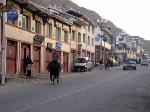
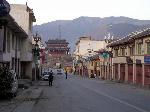
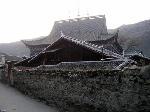
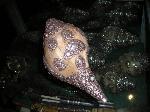
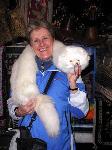
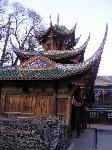
 Copyright © 1998-2025 All rights reserved.
Copyright © 1998-2025 All rights reserved.